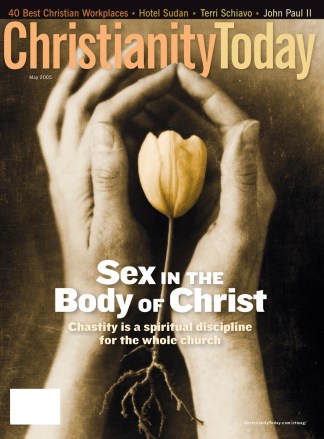Christianity claims a unique place among the world's religions. Our faith tells of a God before whom the strongest saints took off their shoes, bowed down, fell on their faces, repented in dust and ashes. At the same time it tells of a God who came to Earth as a baby, who showed tender mercies to children and the weak, who taught us to call him "Abba," who loved and was loved. God is both transcendent and immanent, the theologians say. God inspires at once awe and love, fear and friendship.
To most moderns, however, a sense of awe comes with the greatest difficulty. We have domesticated angels into stuffed toys and Christmas ornaments, made cartoons of St. Peter at the gate of heaven, tamed the phenomenon of Easter with bunny rabbits, and substituted for the awe of shepherds and wise men cute elves and a jolly man dressed in red. Almighty God gets nicknames like "The Big Guy" and "The Man Upstairs."
An article in the February 2005 issue of this magazine addressed one of my pet peeves. How did it happen that the word worship became synonymous with music? For several months my church went on a hunt for a "worship pastor," and a parade of candidates auditioned with their guitars and backup groups. Some of them prayed, yes: "Lord, just, you know, really be here tonight with us, just let us know you're here." None showed much knowledge of theology, and assuredly none led us toward anything like awe. Worship today means loudly filling every space of silence.
I welcome the sense of celebration and joy apparent in much recent music. Yet I wonder what we are missing when we seek to reduce the distance between creature and Creator, a distance expressed so eloquently by Job, Isaiah, and the psalmists. John, the disciple Jesus loved, who had lain against Jesus' breast, records in Revelation that he fell at his feet as though dead when Jesus appeared in full glory.
The style of worship swings back and forth like a pendulum, from Orthodox to Doukhobors, from Anglican to Quaker, from Lutheran to Moravian, from state-sanctioned churches to counter-cultural emergent churches, and perhaps we need a bit of both. Søren Kierkegaard once said that we treat worship as if the pastor and choir are the actors and the congregation the audience; instead, God should be the audience, the pastor and choir the prompters, and the congregation the true participants. Which brings up an interesting question: What kind of music does God prefer? We will have a long time to learn the answer to that question, it seems, as Revelation gives many scenes of creatures worshiping God through music and through prayer.
Jewish ethicist and writer Abraham Heschel made the observation, "Awe, unlike fear, does not make us shrink from the awe-inspiring object, but, on the contrary, draws us near to it." And Martin Luther was said to pray with the reverence of addressing God and the boldness of addressing a friend.
One worship leader, who is having an increasing impact on Christian music, strives to hold in creative tension the two elements of friendship and fear. Matt Redman, author of such songs as "Heart of Worship," "Better Is One Day," and "Let My Words Be Few," leads the group Soul Survivor, which meets in a large warehouse in London, England. One year, concerned that worship music was turning the focus to musicians rather than God, Redman and his pastor took the daring step of eliminating all music from worship services. After that period of "fasting," he emerged with a new understanding of worship. As he said in a radio interview:
[Worship] is best summed up in Ephesians 5:10, which says, "Find out what pleases the Lord." If you're talking about music, you want to bring an offering that is going to please him and obviously he is not worried about the music, what style it is or if you're playing in time and stuff. When you pour out your heart with the music and you back it up with your life, that is probably the heart of worship.
An album Redman released in 1998, The Friendship and the Fear, takes its title from a verse in Psalm 25: "The friendship of the Lord is for those who fear him." Redman continues exploring the borderland between friendship and fear, for authentic worship encompasses both. It is the proper response when a holy God extends to flawed human beings an invitation to intimacy. In the Hebrew Old Testament, the primary word for worship means "to bow down in reverence and submission." And in the New Testament, the most common Greek word for worship means "to come forward to kiss." Between those two—or combining both—lies our best approach to God.
Copyright © 2005 Christianity Today. Click for reprint information.










